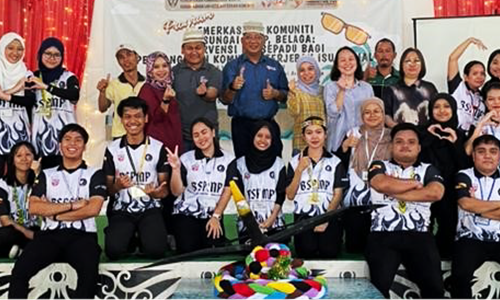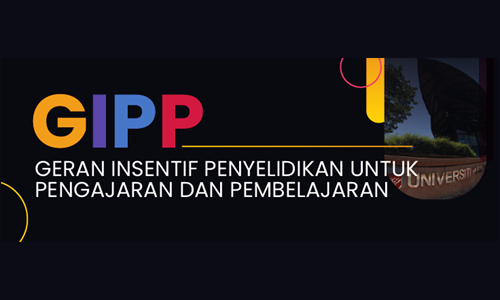|

|
Figure 1: REAL Spectrum. Adapted from Experiential Learning and Competency-Based Education Landscape (EXCEL):
Resilient and Change-Ready Talent (ISBN 978-967-2828-15-0)
|
| |
| |
|
This article describes a Volunteer Internship Program in Microbiology that was created and implemented to provide practical opportunities for the Bachelor of Science in Microbiology with Honours students. Additionally, this article emphasizes the importance of laboratory experience in microbiology education and the significance of incorporating practical experiences into the curriculum, particularly in implementing the Research Infused Experiential Learning (REAL) framework. It also provides helpful tips for effectively integrating the volunteer internship program into the REAL curriculum.
|
| |
The Importance of Laboratory Experience in Microbiology Education
|
| |
|
Microbiology is a field that requires practical experience in a laboratory setting for students to fully comprehend its concepts and applications. Classroom learning provides students with a theoretical foundation (cognitive), but laboratory work provides a hands-on environment where they can apply what they've learned (psychomotor), develop critical thinking and problem-solving skills, and learn to work independently. Laboratory experience is particularly important in microbiology because it is a discipline that deals with microorganisms that are often invisible to the naked eye, making it challenging to understand their characteristics and behavior without practical exposure.
|
| |
Volunteer Internship Program in Microbiology
|
| |
|
Recognizing the importance of hands-on laboratory experience, a Volunteer Internship Program was initiated at the Department of Microbiology, Faculty of Biotechnology and Biomolecular Sciences that offers practical opportunities to the second or third-year Bachelor of Science in Microbiology with Honours students . During the semester break, students are invited to join a research team for a 2 to 4-week attachment at the Enzyme and Microbial Technology Research Center. Since 2017, there have been 11 students participating in this program (on an average of 1-2 students per academic year). Because the program was not yet part of the bachelor's degree curriculum (it is an independent initiative), it was limited to a small number of students.
Under the mentorship of experienced postgraduate students, participants had the opportunity to observe experimental design, planning, and execution by their mentors. They were also given the opportunity to conduct the experiments, operate some advanced equipment, and experience the working culture in the lab. This included learning about laboratory safety protocols, record-keeping, and data analysis techniques commonly used in microbiology research. Throughout the program, students developed practical skills, expanded their knowledge and understanding of the field, and built their research and inquiry skills.
|
| |
Impact of the Volunteer Internship Program
|
| |
|
The internship program has received positive feedback from the participating students. Students appreciated the hands-on experience in a laboratory setting because it allowed them to apply their knowledge, work independently, and build critical thinking skills to overcome challenges that arose during experiments. Students also valued the ability to conduct experiments on their own and learned new laboratory skills. Additionally, the program provided students with the opportunity to connect and collaborate with postgraduate students and gain insight into future paths in research. .
Another significant advantage of the Voluntary Internship Program is that students are more confident in carrying out their final year projects. The program's hands-on experience allows students to become accustomed to working in a laboratory setting and equips them with the skills and knowledge required to effectively accomplish their projects. Early laboratory experience can improve a student's comprehension of microbiology concepts and applications, as well as their ability to work independently and troubleshoot problems.
All of the competencies gained through the Volunteer Internship Program, such as practical and research skills, critical thinking skills, and problem solving skills, align with REAL Spectrum Level 3. This level specifically focuses on developing research and inquiry skills through practical sessions or attachments with mentors in the field.
|
| |
Integrating Volunteer Internship Programs into REAL Curriculum
|
| |
|
The Volunteer Internship Program provides a valuable model for readers who are looking to incorporate practical and research experiences into their curriculum, specifically towards the implementation of REAL. To ensure success, it is recommended that others consider the following tips:
|
- Encourage Second Year students to undergo this short internship program as Level 3 REAL should be achieved in the second year of a program.
- Assign experienced postgraduate students as mentors, as they can provide valuable guidance and support to the students.
- Ensure that the program aligns with the level of the students' understanding, and that they are exposed to equipment and techniques that are appropriate for their level of knowledge.
- Incorporate regular assessments and evaluations to gauge the students' understanding and provide feedback for improvement. For instance, students can be asked to present their work experience or organize a progress meeting to discuss their findings, challenges faced, and areas where they need further assistance. These assessments and evaluations will help identify gaps in their learning and allow for targeted feedback and support to improve their skills and knowledge.
|
| |
| |
|
In conclusion, the Volunteer Internship Program in Microbiology is a good model for incorporating hands-on microbiology experience with the REAL framework. By actively participating in the program, students could increase their confidence in conducting experiments and become better prepared to achieve a higher level of the REAL spectrum. Completing this program also provides students with a valuable addition to their resume and enhances their competitiveness in the job market. Meaningful research experiences could help students develop the skills and knowledge necessary for success in their future careers. The success of this program demonstrates the importance of practical experience in microbiology and highlights the benefits of the REAL framework in enhancing the national curriculum. With the recent announcement of the EXCEL initiative, it is clear that there is a need for more programs that provide hands-on research experiences for students.
|
| |
|
| |
|
Prepared by:
|




























